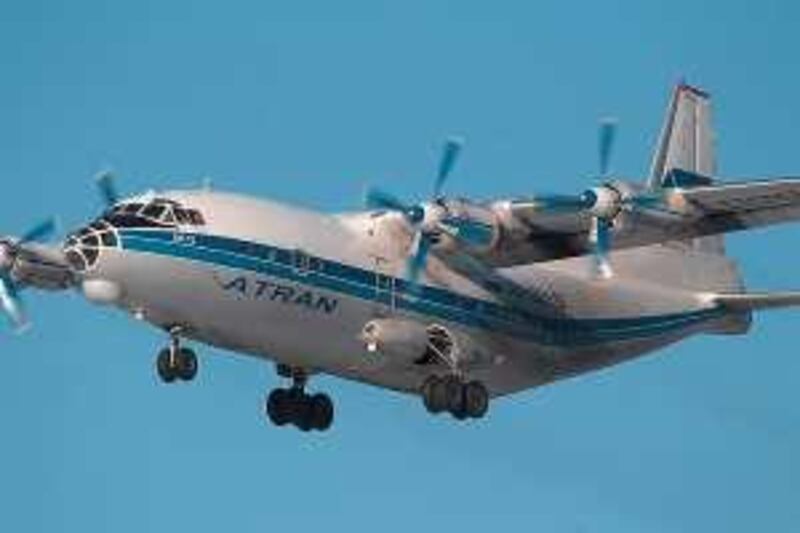DUBAI // Nearly five months after it was ordered to leave the country, the Antonov An-12 will once again take to the air in the UAE. At least four operators in Sharjah and Fujairah have received written permission from the General Civil Aviation Authority (GCAA) to fly the Ukrainian-made transport plane, they said yesterday.
The aircraft was banned on January 8 after four accidents, including one UAE-bound flight that crashed killing seven people shortly after taking off from Iraq. Although the ban was lifted in April, operators complained that bureaucratic obstacles kept them grounded. Saif al Suwaidi, the director general of the GCAA, said several operators had been cleared to fly the aircraft after meeting newly imposed conditions.
"They fully complied with our regulations, and they are free to fly," he said. The conditions, which included a demand for documents written in English and extra pilot training, will remain in place, he said. The move has excited the country's An-12 operators, who said they lost money while the restrictions were imposed. At least seven of more than a dozen are thought to have either moved operations to other countries or gone bankrupt.
"We're back in action!" Alexander Smolin, an unofficial spokesman for UAE cargo operators, said. Only those companies that presented the GCAA with the additional documentation required to fly the An-12 had been cleared, Mr Smolin said. But he was confident that every operator eventually would be cleared, although the process took longer than a month, in some cases, to produce a green light. The document sent to operators "is actually the release for everybody who submitted the documents duly, and who actually complied with all the demands," he said.
"We are very, very happy," he added. "It will take us some time to go ahead, but it's OK." A secretary for TransAviaService, a Georgian airline with an office in the Sharjah International Airport Free Zone, said the company was preparing to fly its An-12. TransAviaService has alerted its flight crew, who returned to Ukraine and Russia after the ban. Its An-12, which was moved to Sulaimaniya, Iraq, in February, will be flown back into Sharjah.
"We requested more information from GCAA today because we wanted to know if it's a final release - we weren't sure what to think, if it was a game or something," said the secretary, who spoke on condition of anonymity. "But they explained that this ban is lifted, so from their side, we've been cleared." Others, including Alexander Kolganov, commercial director for the Sharjah-based Transliz Aviation, have yet to receive the go-ahead. The An-12 is considered one of the planes of choice for delivering cargo in hard-to-reach, treacherous corners of the globe.
The rugged workhorse has earned a reputation for its ability to land on rough surfaces, including dirt, grass and ice, while its operating costs are said to be less than those of its Western-made counterparts. But GCAA blacklisted it in UAE airspace, citing concerns with the aircraft's steering system and crew performance. Officials also said some operators were not taking adequate safety precautions. Some operators say the rationale for the ban has never been clearly explained, and some of the new documents required by the GCAA since the ban's repeal are difficult to obtain or do not exist.
The plane has been banned in other countries, such as Iran and Sudan, but international aviation experts say that blanket bans on particular models of aircraft are rare. Typically they are imposed on individual companies. hnaylor@thenational.ae






